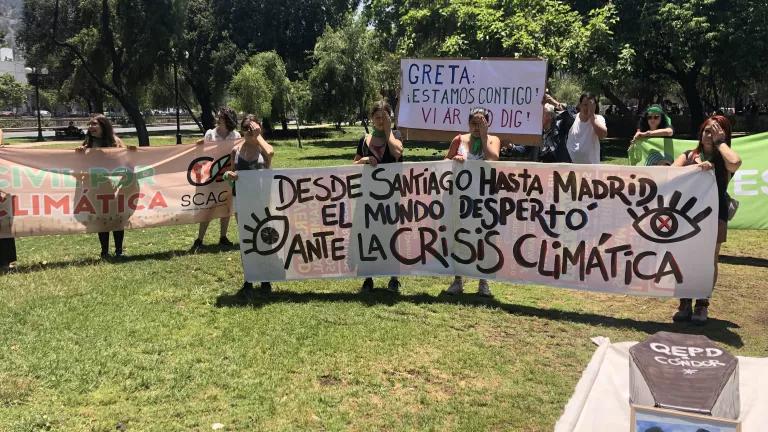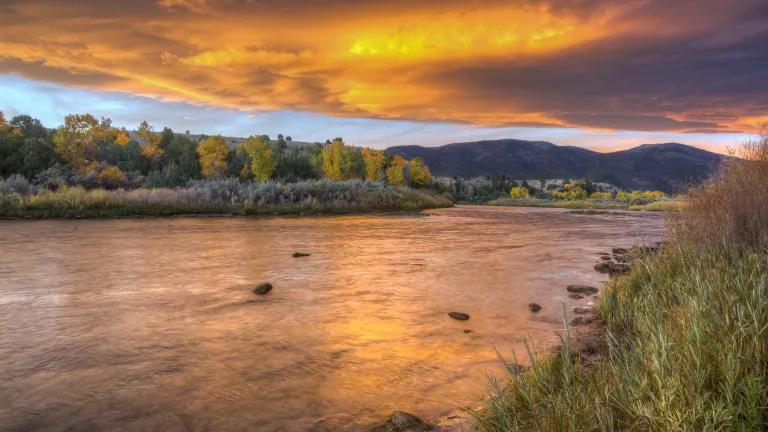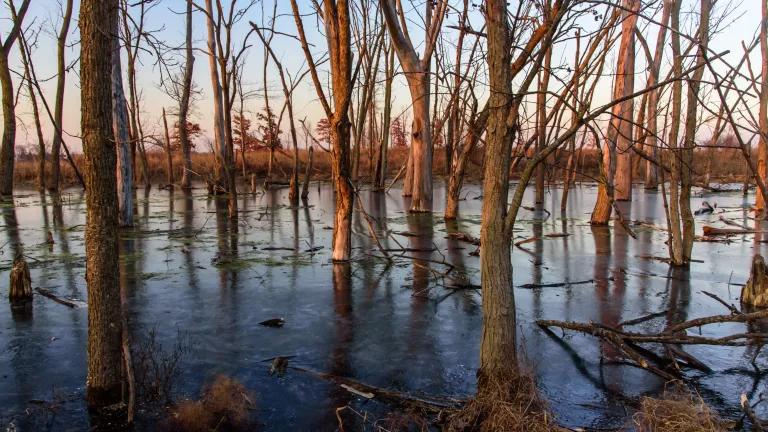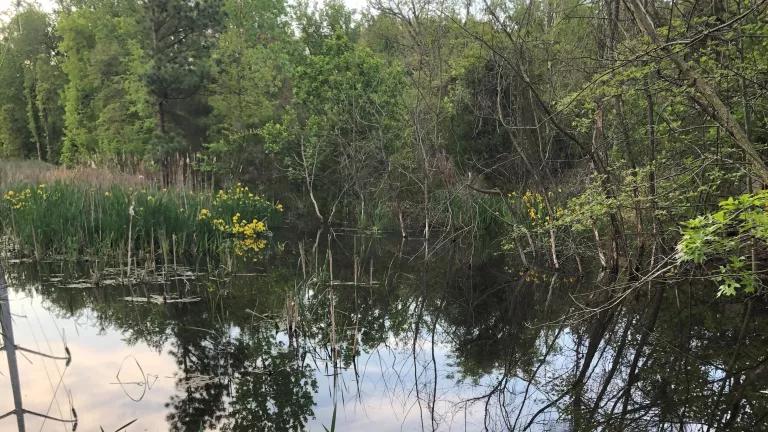
This blog was co-authored with James Blair.
“El agua, el agua, el agua, es un derecho, no un negocio, no un privilegio”
“Water, water, water, is a right, not a business, not a privilege”
Used as a rallying cry during protests, this chant rang out as an underlying current throughout an alternative climate conference held in Santiago, Chile from December 2-11, 2019. Chile is the only country in the world with a privatized water system, and uneven water access has been one of the most critical issues fueling the country’s on-going social uprising.
In mid-October, protests over a 30-peso (about 4 U.S. cents) increase in metro fares broke out in Santiago. The government’s harsh crackdown on those protesters, who were largely students, quickly incited more protests throughout Chile. Beyond the metro increase, the protests reflected widespread discontent with long-standing economic and social inequality. Another common chant in marches was “It’s not about 30 pesos, it’s about 30 years,” commenting on the lack of concrete policy and constitutional changes since the end of Augusto Pinochet’s brutal military dictatorship (1973-1989). In response to protests, Chile’s government declared a state of emergency and instituted a curfew. Throughout the protests, disproportionate repression was carried out by the state, including damaging hundreds of protestors’ eyes with lead projectile bullets, sexual assault, and deaths. As protests and on-going violence continued, the UN COP25 climate change summit was moved from Santiago to Madrid.

“No es sequía, es saqueo”
“It isn’t drought, it’s theft”
Even though the official COP25 was relocated, the local Chilean coalition Civil Society for Climate Action (SCAC) organized a two-week long “Parallel COP” or Social Summit for Climate Action in Santiago that included workshops, seminars, and other events to discuss climate issues in Chile and the Americas more broadly. There was also a grassroots summit called Cumbre de los Pueblos (Summit of the People) held concurrently. The SCAC summit showcased advocacy and activism of the environmental movement in Latin America. Each day represented a different key issue: water, nature, and energy transition to Indigenous and women’s rights, environmental justice, and climate governance. It was also peppered with cultural events including an ecofeminist “funeral” march lamenting the potential demise of iconic national fauna like the elk-like huemul and the condor. Yet, throughout the conference, the most sustained focus remained on water.

NRDC partners from the Red por los Ríos Libres (Free-Flowing Rivers Network), gave talks on current threats to Chile’s watersheds from controversial development projects, including: mining in Patagonia, a proposed national water transport system, the Alto Maipo hydroelectric complex near Santiago, and the on-going drought. The above popular protest chant, “it isn’t drought, it’s theft,” alludes to major industries like agriculture, large hydro and mining that have stolen citizens’ water.
NRDC Consultant and Assistant Professor at Cal Poly Pomona, James Blair, joined community leaders and members of the Plurinational Observatory of Andean Salt Flats to discuss key findings from a forthcoming report on induced water scarcity and environmental impacts from extracting lithium, a key component of lithium-ion batteries used, for example, in smartphones and electric vehicle batteries. The brine aquifers of northern Chile, Argentina, and Bolivia contain 50-75 percent of the global lithium supply. Nonetheless, the evaporation method used to produce this resource—and to meet the growing global demand —is resulting in severe water scarcity in the high-altitude saline wetlands. These lagoons are home to three out of six species of flamingos, as well as unique biodiverse communities of mammals, lizards and myriad micro-organisms.

SCAC events also spread into different regions in Chile. In the case of lithium, Ramón Balcázar from the Plurinational Observatory of Andean Salt Flats and Tantí Foundation organized a stimulating workshop in the northern city of San Pedro de Atacama – the hub of much lithium activity—to highlight the complexities of the lithium industry there. In the Atacama salt flat, the Indigenous Consejo de Pueblos Atacameños (Lickanantay) has established a benefit-sharing agreement with one company, Albermarle. However, community members have also protested unauthorized operations, sub-par working conditions and inadequate environmental monitoring, employing direct action tactics like road blockades and hunger strikes against SQM, a controversial firm plagued by corruption scandals. At the COP25 in Madrid, President of the Consejo, Sergio Cubillos, seized the stage at the Chile pavilion to confront the country’s Minister of Environment about this improper consultation process and ecological crisis.

“Ya vas a ver, los ríos que nos robaron van a volver”
“You’ll see, the rivers that they took from us will come back”
One of the most compelling events held in conjunction with the parallel climate summits in Chile during these two weeks was the 5th International Tribunal on the Rights of Nature. The Rights of Nature Tribunals were initiated by the Global Alliance for the Rights of Nature (GARN) to create a forum for people from around the world to speak on behalf of the environment. The tribunals gather experts in law, policy, government, and the academe to take the cases presented to enact change (however, the Tribunal’s decisions are not binding as it is not an official government institution).
This year’s tribunal opened with a Mapuche water ceremony to acknowledge ancestors and create a sense of solidarity amongst the more than 150 participants. Three primary cases were presented to a tribunal of leaders from Latin America, including: (1) lithium mining in the Atacama Desert; (2) threats to waters of Patagonia, especially mining and salmon fisheries; and (3) water privatization in Chile. These cases were all accepted by the tribunal as threats to the rights of Nature. Along with the three Chilean cases, the fires in the Bolivian and Brazilian Amazon, and fracking in Argentina were presented for consideration by the tribunal, ultimately accepted for further investigation, and will be analyzed in the next tribunal. Each case was presented by affected communities who articulated their struggle in the face of extractive industries.

After hearing the testimonies of the three Chilean cases, the tribunal recommended that the Chilean State:
- increase protections on protected and conservation areas;
- follow processes of previous environmental impact consultations;
- establish precautionary measures so that human activity does not affect the environment in question;
- establish restorative justice for affected Indigenous communities;
- condemn mining and salmon industries and charge them with the cost of their actions;
- and finally, to push the Chilean State to establish a new constitution that will honor the rights of nature.
While it seems that the results of the official COP25 have been lacking at best, the SCAC summit offered a powerful view of the intersection between large-scale civic unrest and the thriving environmental movement in Chile. And these efforts are bearing fruit. In April, a plebiscite will be held to rewrite the Chilean constitution, part of which will hopefully include a new water code.



